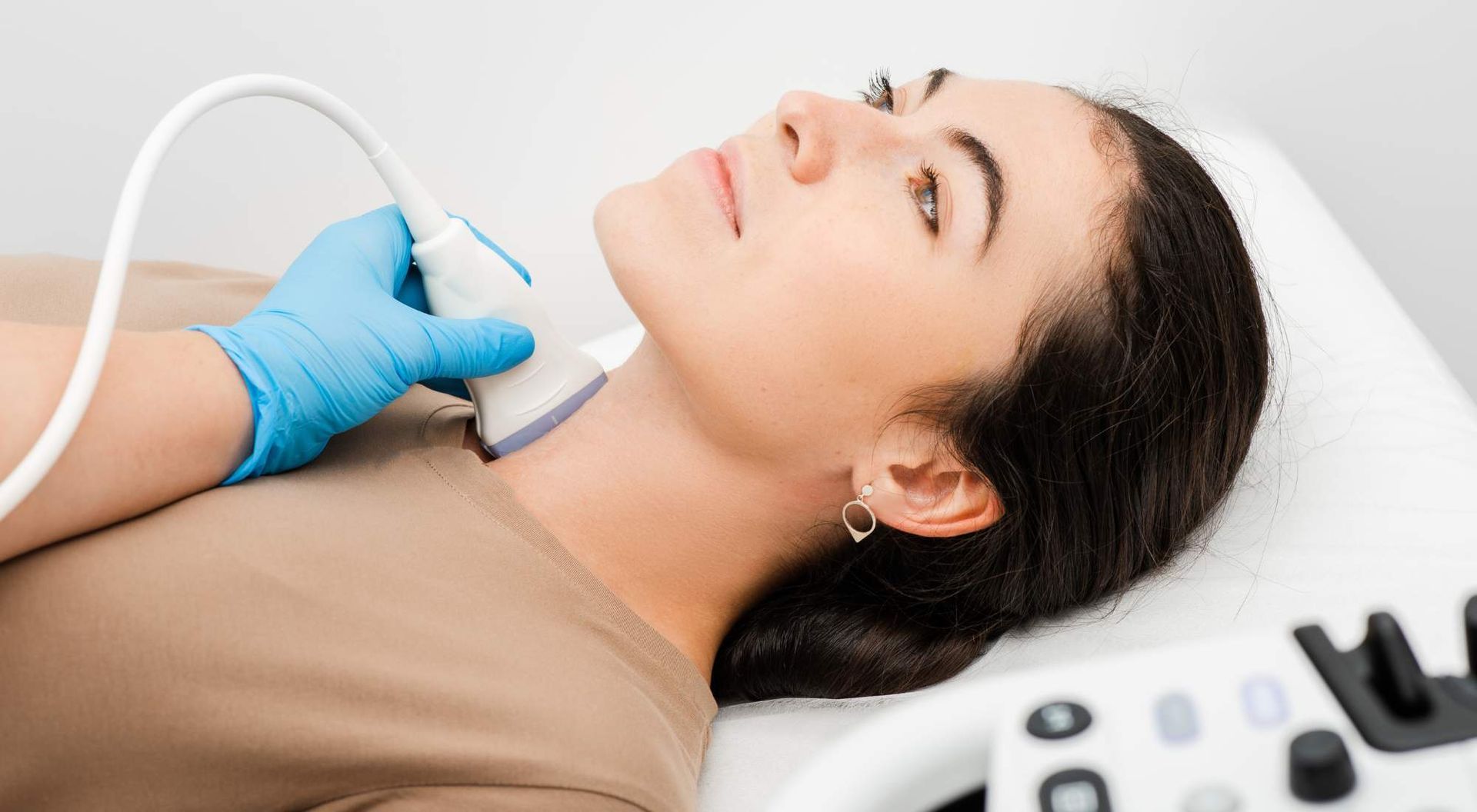Thyroid and Skin Issues: Why They Are Connected and How You Can Manage the Symptoms
"The content below is not intended to be a substitute for professional medical advice, diagnosis, or treatment. Always seek the advice of your physician or other qualified health provider with any questions you may have regarding a medical condition."
You’re disappointed yet again by the presentation of what appears to be another health problem. Maybe you’ve already been diagnosed with a thyroid issue, but now you realize your skin is in bad shape. Or maybe you haven’t been diagnosed, and skin irregularities accompany other symptoms you can’t explain.
Either way, learning how troubles with skin health are closely linked with thyroid dysfunction is revelatory — it means your skin condition is not a mystery and you can address the problem by understanding its cause.
Read on to learn how thyroid health affects your skin and what actions you can take to find relief.
Table of Contents
Can Thyroid Problems Cause Skin Problems?
Because of the thyroid’s critical role in regulating body metabolism and skin homeostasis, many skin abnormalities may be attributable to thyroid dysfunction. The thyroid greatly impacts the skin — one of its major target organs. In fact, skin manifestations are often the first sign of a thyroid problem.
HealthierU can help you understand the relationship between the
thyroid and skin issues you might be experiencing. Contact Dr. Sergi today for an in-depth analysis of your skin condition as it relates to the health of your thyroid.
Types of Skin Issues Thyroid Patients May Experience
Skin problems may present in various ways, depending on the nature of the thyroid dysfunction. Common skin problems thyroid patients might experience include:
- Dry, rough, scaly skin
- Localized or general itchiness
- Intolerance of cold or heat
- Swelling
- Hair loss
- Rash, hives, changes in pigmentation
- Unusual warmth, due to increased blood flow
3 Ways Skin Issues May Manifest With Thyroid Disease
Some skin changes appear as a result of thyroid hormone’s direct action on skin or non-skin tissues. Others manifest when thyroid dysfunction is caused by an autoimmune disease.
#1: Thyroid Hormone Directly Acting on the Skin
The skin is made up of the four-layered epidermis and the dermis. Hair follicles, blood vessels, and oil glands are embedded in the dermis. Epidermal stem cells are produced inside hair follicles and regulate cell turnover in the epidermis.
The base layer (stratum basale) of the epidermis contains cells called keratinocytes that continually replenish the epidermis. When these cells move toward the surface of the skin they differentiate, changing their function to form the barrier layer (stratum corneum).
A balance between the production and differentiation of new cells is critical. Thyroid hormone is important in striking that balance:
- It accelerates the formation of the stratum corneum.
- It stimulates epidermal and dermal cell growth.
Thyroid hormone receptors have been identified in many cell types located in the skin. Disruptions in signaling or binding to these receptors — due to flaws within the receptors or to inadequate amounts of circulating thyroid hormone — lead to abnormal skin presentations, such as:
- Dry, rough, thin, and scaly skin
- Yellow pigmentation, due to the accumulation of carotene in the dermis
- Myxedema, due to the accumulation of hyaluronic acid
- Decreased sweat gland secretion
- Paleness, due to the accumulation of mucopolysaccharides and water in the dermis
#2: Skin Issues From Direct Hormone Action on Non-Skin Tissues
Skin issues resulting from hormone action on non-skin tissues are largely due to hyperthyroidism. Patients with this condition often experience:
- Warm, smooth, moist skin: Warmth is due to increased blood flow, which may also cause facial flushing and palmar erythema (red palms).
- Heavy sweating: This is due to the increase in metabolism and may be present in association with pretibial myxedema, the swelling of tissues above the shin bone.
- Hyperpigmentation: This may cover the body or be localized. The physiology may involve the excessive release of adrenocorticotropic hormone, which stimulates melanin production.
- Jaundice: Thyroid hormone is essential for liver function, and the liver helps metabolize thyroid hormone. The mechanism causing jaundice, however, is unclear.
Hypothyroidism may affect non-skin tissues as well, leading to these manifestations in the skin:
- Purpura, due to diminished clotting factors
- Cool, pale skin resulting from decreased
perfusion of blood vessels
#3: Autoimmune Associations
Some skin manifestations are symptoms of an autoimmune disease that underlies or is otherwise associated with thyroid dysfunction, such as:
- Vitiligo – The loss of color or pigment
- Urticaria – Also commonly known as hives
- Grave’s Disease – May cause the skin to become reddish, thick, and rough
- Hashimoto’s Disease – May cause dry skin and rashes
- Alopecia areata – The sudden loss of hair due to an autoimmune attack on the hair follicles
Comparing Thyroid and Skin Issues in Hypothyroidism and Hyperthyroidism
As suggested above, the precise skin manifestations that affect people with thyroid dysfunction often follow a pattern — they depend on whether the patient has too much or too little thyroid hormone.
Skin Issues With Hypothyroidism
Hypothyroidism is a condition in which the thyroid does not produce enough thyroid hormone to adequately regulate body metabolism. Its effects are widespread, including fatigue, weight gain, and cold intolerance.
Skin problems resulting from hypothyroidism include:
- Dry, itchy skin
- Scaly, rough skin
- Pale, thin, wrinkled skin
- Carotenemia
- Cold peripheries
- Poor wound healing
- Hypohidrosis
- Myxedema
Skin Issues With Hyperthyroidism
Hyperthyroidism is a condition in which the thyroid is overactive. It produces high levels of thyroid hormone, leading to weight loss, increased appetite, rapid heartbeat, and anxiety, among other symptoms.
Skin problems associated with hyperthyroidism include:
- Smooth, soft, thin, warm, moist skin
- Generalized itchiness or a raised itchy rash
- Thickening of skin on the shin
- Tender, red-brown nodules on the lower legs
- Swelling and clubbing of the fingers
- Hyperhidrosis
Treatment Options and Recommendations
To treat skin symptoms caused by thyroid dysfunction, the following actions are a good starting point:
- Receive blood testing
- Consider medicines and ointments
- Eliminate toxic products
- Follow a supportive diet
HealthierU can help you find relief. By providing holistic and personalized care, Dr. Sergi helps you navigate each step of the treatment process.
Lab Tests
Testing hormone levels in the blood is an important diagnostic step to determine the precise cause of your skin ailments. Blood levels of thyroid hormone indicate how well the thyroid is functioning.
Patients with hypothyroidism often have low levels of T3 and T4 with higher-than-normal thyroid-stimulating hormone (TSH) levels. Patients with hyperthyroidism usually have lower-than-normal TSH levels and high T3 and T4 levels.
A thyroid antibody test shows the presence or absence of antibodies that attack the thyroid, which might indicate that thyroid dysfunction results from an autoimmune disease such as Hashimoto’s or Grave’s disease.
Medications and Topical Ointments
Hormone replacement therapy is often the go-to treatment for hypothyroidism. For example, replacing lost thyroid hormone with the synthetic version, levothyroxine, may eliminate or reduce skin symptoms caused by low thyroid hormone.
Research has shown that the use of systemic or topical
corticosteroids may be of help in bringing about remission of skin pathologies. The key to finding lasting relief is to address the root of the problem.
Check Toxicity Levels of Your Personal Care Products
Many items for everyday use contain toxic chemicals that may disrupt hormone levels. These include:
- Plastic food containers: Plastics from the containers can leach into the foods they contain, whether they are heated or not. Use glass storage containers instead.
- Antibacterial soaps and toothpaste: These may contain triclosan, which is absorbed through the skin or mucosal lining of the mouth and may lead to skin irritation and a weakened immune system, among other serious health problems.
- Makeup, body wash, sunscreen, etc.: Use Environmental Working Group’s Skin Deep database to find a data-based risk rating for each of your personal care products.
Holistic Nutrition
Nutrition and lifestyle changes can help manage chronic skin symptoms, even those resulting from thyroid dysfunction, because many are linked to diet.
The following are important elements of a skin-healthy diet:
- Vitamin A: This is excellent for skin health because it fights free radicals, aids in new cell growth, reduces inflammation, and promotes wound healing. Foods rich in vitamin A include:
- Red bell peppers
- Sweet potatoes
- Spinach
- Cantaloupe
- Carrots
- Low-fat yogurt
- Antioxidants: These protect skin cells against damage from free radicals, such as those formed from sun exposure. Foods rich in antioxidants include:
- Blackberries
- Blueberries
- Strawberries
- Plums and prunes
- Beans
- Pecans
- Essential fatty acids: These are essential for maintaining healthy cell membranes and thus help regulate nutrients’ entrance into cells and waste product disposal. Foods rich in omega 3s include:
- Fish
- Walnuts
- Flaxseed
- Healthy oils: Besides containing essential fatty acids, these help lubricate the skin and keep it looking healthy. Opt for cold pressed, expeller processed, or extra virgin oils, which haven’t been depleted of nutrients due to excessive processing.
- Selenium: This mineral may help protect against cellular damage due to ultraviolet radiation. Selenium-rich whole grains can take the place of white-flour items that are bad for skin health. Other foods containing selenium are:
- Turkey
- Tuna
- Brazil nuts
- Anti-inflammatory foods: Many skin problems — such as acne, eczema, and pigmentation — are caused in some form or fashion by inflammation. Thus, following an anti-inflammatory diet may help heal various skin ailments. Eat foods such as:
- Tomatoes
- Green leafy vegetables
- Green tea
- Fatty fish, such as salmon, tuna, and sardines
- Fruits, especially berries and oranges
- Water: Staying hydrated ensures you will receive many benefits from this simple commodity:
- Improved skin density and elasticity
- Increase blood flow, enhancing the delivery of oxygen and nutrients to the skin
- Better overall skin health, which promotes wound healing and protection against pathogens
Besides focusing on consuming these skin-healthy foods, you can pinpoint food sensitivities unique to you by adopting an elimination diet. HealthierU is a wonderful resource for you if you would like support on your journey toward better skin health.
Find Lasting Relief From Thyroid-Related Skin Issues With a Personalized Holistic Nutrition Plan at HealthierU
Dr. Donna Sergi at HealthierU is a holistic nutritionist and chiropractor with decades of experience helping her clients live high-quality lives with thyroid dysfunction. She offers the best hypothyroidism treatment in Brooklyn.
By providing natural remedies, personally relevant advice, and a customized nutrition plan, HealthierU can set you on the right track toward healthier skin and a better command of your health in general.
Contact us today to receive a free consultation and begin a new routine that will bring you symptomatic relief and an overall improvement in your well-being.






